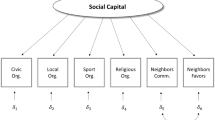Abstract
In Western contexts, associational life is mostly thought of as the historical and almost natural outcome of the accumulated experiences of bottom-up, horizontal cooperation among citizens. The attitudinal disposition to trust, reciprocate and cooperate is closely linked to the existence of certain structures, like associations and associational membership, which exactly indicate the overcoming of the collective action dilemma. Both attitudes and structures, thus, form the two main components within the social capital debate. As such, large numbers of associations and elevated levels of associational membership tend to go hand in hand with high generalized trust scores. Taken together they point to the existence of a vibrant civil society with large social capital stocks (Putnam 1993). Social capital, understood as the presence of dense, horizontal networks of civic engagement and generalized norms of trust and reciprocity, seems to be the driving force for democratic performance and economic prosperity (Putnam 1993; Knack and Keefer 1997; Harrison and Huntington 2000).
Access this chapter
Tax calculation will be finalised at checkout
Purchases are for personal use only
Preview
Unable to display preview. Download preview PDF.
Similar content being viewed by others
References
Brett, E. A. (1996). “The Participatory Principle in Development Projects: The Costs and Benefits of Cooperation.” Public Administration and Development 16, 5–19.
Coleman, J. S. (1988). “Social Capital in the Creation of Human Capital.” American Journal of Sociology 94, S95–S120.
Coleman, J. S. (1990). Foundations of Social Theory. Cambridge: Harvard University Press.
Dasgupta, P. and I. Serageldin (2000). Social Capital: A Multifaceted Perspective. Washington: The World Bank.
Edwards, B. and M. Foley (1998). “Social Capital and Civil Society beyond Putnam.” American Behavioral Scientist 42(2), 124–139.
Eisenstadt, S. N. and L. Röniger (1984). Patrons, Clients and Friends, Interpersonal Relations and the Structure of Trust in Society. Cambridge: Cambridge University Press.
Gambetta, D. (1988). Trust: Making and Breaking Cooperative Relations. Oxford: Blackwell.
Granovetter, M. (1982). “The Strength of Weak Ties.” pp. 105–130. In P. Marsden and N. Lin, Social Structure and Network Analysis. London: Sage.
Harrison, L. (1985, rev. ed. 2000). Underdevelopment Is a State of Mind: The Latin American Case. Lanham: Madison Books.
Harrison, L. (2000). “Why Culture Matters.” pp. xvi–xxxiv. In L. Harrison and S. Huntington (eds.), Culture Matters: How Values Shape Human Progress. New York: Basic Books.
Harrison, L. and S. Huntington (eds., 2000). Culture Matters: How Values Shape Human Progress. New York: Basic Books.
Hulme, D. and M. Edwards (eds., 1997). NGOs, States and Donors, Too Close for Comfort? London: MacMillan.
Huntington, S. (2000), “Cultures Count.” pp. xiii–xvi. In L. Harrison and S. Huntington (eds.), Culture Matters: How Values Shape Human Progress. New York: Basic Books.
Huntington, S. and J. Nelson (1976). Political Participation in Developing Countries: No Easy Choice. London: Harvard University Press.
Inglehart, R. (1988). “The Renaissance of Political Culture.” American Political Science Review 82(4), 1203–1230.
Inglehart, R. (1997). Modernization and Postmodernization, Cultural, Economic and Political Change in 43 Societies. Princeton: Princeton University Press.
Inglehart, R. (2000). “Culture and Democracy.” pp. 80–97. In L. Harrison and S. Huntington (eds.), Culture Matters: How Values Shape Human Progress. New York: Basic Books.
Knack, S. and P. Keefer (1997). “Does Social Capital Have an Economic Payoff? A Cross-Country Investigation.” Quarterly Journal of Economics 112, 1251–1288.
Lagos M. (1997). “Latin America’s Smiling Mask.” Journal of Democracy 8(3), 125–138.
Lin, N. (1982). “Social Resources and Instrumental Action.” pp. 131–145. In P. Marsden and N. Lin (eds.), Social Structure and Network Analysis. London: Sage.
Lin, N. (1995). “Social Resources: A Theory of Social Capital.” Revue Française de Sociologie 36(4), 685–704.
Nederveen Pieterse, J. (1996). My Paradigm or Yours? Alternative Development, Post-Development, Reflexive Development. ISS Working Paper Nr. 229.
Newton, K. (1997). “Social Capital and Democracy.” American Behavioral Scientist 40(5), 575–586.
Newton, K. (1999). “Social and Political Trust in Established Democracies.” pp. 169–187. In P. Norris (ed.), Critical Citizens. Oxford: Oxford University Press.
Portes, A. (1998). “Social Capital. Its Origins and Applications in Modern Sociology.” Annual Review of Sociology 24, 1–24.
Putnam, R. (1993). Making Democracy Work. Civic Traditions in Modern Italy. Princeton: Princeton University Press.
United Nations Development Program (1993). Human Development Report1993. New York: Oxford University Press.
Vandana, D. (1996). “Access to Power and Participation.” Third World Planning Review 18(2), 217–242.
Van der Linden, J. (1997). “On Popular Participation in a Culture of Patronage: Patrons and Grassroots Organizations in a Sites and Services Project in Hyderabad, Pakistan.” Environment and Urbanisation 9(1), 81–89.
Varela Hidalgo, B. et al. (1998). Los ONG en Nicaragua, Limitaciones y Tendencias en su Relación con la Cooperación Internacional. Managua: C.N.O FONG-INIES.
Wasserman, S. and K. Faust (1994). Social Network Analysis: Methods and Applications. Cambridge: Cambridge University Press.
Woolcock, M. (1998). “Social Capital and Economic Development: Toward a Theoretical Synthesis and Policy Framework.” Theory and Society 27(2), 151–208.
World Bank (1991). World Development Report 1991. New York: Oxford University Press.
World Bank (1994). The World Bank and Participation. Washington: The World Bank.
Editor information
Copyright information
© 2003 Marc Hooghe and Dietlind Stolle
About this chapter
Cite this chapter
Molenaers, N. (2003). Associations or Informal Networks? Social Capital and Local Development Practices. In: Hooghe, M., Stolle, D. (eds) Generating Social Capital. Palgrave Macmillan, New York. https://doi.org/10.1057/9781403979544_6
Download citation
DOI: https://doi.org/10.1057/9781403979544_6
Publisher Name: Palgrave Macmillan, New York
Print ISBN: 978-1-4039-6220-1
Online ISBN: 978-1-4039-7954-4
eBook Packages: Palgrave Political & Intern. Studies CollectionPolitical Science and International Studies (R0)




